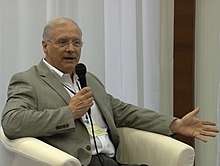David Lubinski
David J. Lubinski is an American psychology professor known for his work in applied research, psychometrics, and individual differences. His work (with Camilla Benbow) has focussed on exceptionally able children: the nature of exceptional ability,[1] the development of people with exceptional ability[2] (in particular meeting the educational needs of gifted children[3] to maximise their talent). He has published widely on the impact of extremely high ability on outputs such as publications, creative writing and art, patents etc.[4] This work disconfirmed the "threshold hypothesis" which suggested that a certain minimum of IQ might be needed, but higher IQ did not translate into greater productivity or creativity. Instead his work shows that higher intelligence leads to higher outcomes with no apparent threshold or dropping off of its impact.[5]
David Lubinski | |
|---|---|
 David Lubinski in 2016 | |
| Born | David J. Lubinski United States |
| Nationality | United States |
| Citizenship | United States |
| Alma mater | University of Minnesota |
| Known for | Research on intelligence, Giftedness |
| Awards | Distinguished Scientific Award for Early Career Contribution to Psychology (Applied Research/Psychometrics), Association for Gifted Children Distinguished Scholar Award |
| Scientific career | |
| Fields | Psychology |
| Institutions | Vanderbilt University |
| Influences | Lloyd G. Humphreys, Julian Stanley |
Education
He earned his B.A. and PhD from the University of Minnesota in 1981 and 1987 respectively. He was a Postdoctoral Fellow at University of Illinois at Urbana-Champaign from 1987 to 1990 with Lloyd G. Humphreys. He taught at Iowa State University from 1990 to 1998 and took a position at Vanderbilt University in 1998, where he currently co-directs the Study of Mathematically Precocious Youth (SMPY), a longitudinal study of intellectual talent, with Camilla Benbow.[6][7]
In 1994, he was one of 52 signatories on "Mainstream Science on Intelligence",[8] an editorial written by Linda Gottfredson and published in the Wall Street Journal, which declared the consensus of the signing scholars on issues related to intelligence research following the publication of the book The Bell Curve.
In 1996, he won the American Psychological Association Distinguished Scientific Award for Early Career Contribution to Psychology (Applied Research/Psychometrics). In 2006, he received the Distinguished Scholar Award from the National Association for Gifted Children (NAGC). In addition to this, his work has earned several Mensa Awards for Research Excellence and the organisations Lifetime Achievement Award.[9] He is an APA Division 1 Fellow. He has edited a book with Camilla Benbow, and another with Rene V. Dawis, and has published over 50 refereed journal articles.
Published works
Selected articles
- Lubinski, D.; Benbow, C.P.; Kell, H.J. (2014). "Life paths and accomplishments of mathematically precocious males and females four decades later" (PDF). Psychological Science. 25 (12): 2217–2232. doi:10.1177/0956797614551371. PMID 25384550.
- Lubinski, D.; Benbow, C. P. (2006). "Study of Mathematically Precocious Youth (SMPY) after 35 years: Uncovering antecedents for the development of math-science expertise". Perspectives on Psychological Science. 1 (4): 316–343. doi:10.1111/j.1745-6916.2006.00019.x. PMID 26151798.
- Lubinski, D.; Benbow, C. P.; Webb, R. M.; Bleske-Rechek, A. (2006). "Tracking exceptional human capital over two decades". Psychological Science. 17 (3): 194–199. doi:10.1111/j.1467-9280.2006.01685.x. PMID 16507058.
Books (edited)
- Benbow CP, Lubinski, D. J. (Eds.) (1996). Intellectual talent: Psychometric and social issues. Johns Hopkins University Press. ISBN 0-8018-5302-8
- Lubinski DJ, Dawis, R. V. (Eds.) (1995). Assessing individual differences in human behavior: methods, concepts, and findings. Palo Alto, CA: Consulting Psychologists Press. ISBN 0-89106-072-3
References
- Lubinski, David (2009). "Exceptional Cognitive Ability: The Phenotype". Behavior Genetics. 39 (4): 350–358. doi:10.1007/s10519-009-9273-0. ISSN 0001-8244. PMID 19424784.
- Lubinski, D.; Benbow, C. P.; Webb, R. M.; Bleske-Rechek, A. (2006). "Tracking Exceptional Human Capital Over Two Decades" (PDF). Psychological Science. 17 (3): 194–199. doi:10.1111/j.1467-9280.2006.01685.x. ISSN 0956-7976. PMID 16507058.
- Bleske-Rechek, A.; Lubinski, D.; Benbow, C. P. (2004). "Meeting the Educational Needs of Special Populations: Advanced Placement's Role in Developing Exceptional Human Capital". Psychological Science. 15 (4): 217–224. doi:10.1111/j.0956-7976.2004.00655.x. ISSN 0956-7976. PMID 15043637.
- Park, Gregory; Lubinski, David; Benbow, Camilla P. (2008). "Ability Differences Among People Who Have Commensurate Degrees Matter for Scientific Creativity". Psychological Science. 19 (10): 957–961. doi:10.1111/j.1467-9280.2008.02182.x. ISSN 0956-7976. PMID 19000201.
- Robertson, K. F.; Smeets, S.; Lubinski, D.; Benbow, C. P. (2010). "Beyond the Threshold Hypothesis: Even Among the Gifted and Top Math/Science Graduate Students, Cognitive Abilities, Vocational Interests, and Lifestyle Preferences Matter for Career Choice, Performance, and Persistence" (PDF). Current Directions in Psychological Science. 19 (6): 346–351. doi:10.1177/0963721410391442. ISSN 0963-7214. Retrieved September 8, 2015.
- "Study of Mathematically Precocious Youth". my.vanderbilt.edu. Vanderbilt University. Retrieved October 17, 2015.
- Hambrick, David Z.; Meinz, Elizabeth J. (November 19, 2011). "Sorry, Strivers: Talent Matters". The New York Times. Retrieved October 17, 2015.
- Gottfredson, Linda (December 13, 1994). Mainstream Science on Intelligence. The Wall Street Journal, p A18.
- Brasher, Joan (July 17, 2015). "Lubinski honored with Mensa Lifetime Achievement Award". news.vanderbilt.edu. Vanderbilt University. Retrieved October 17, 2015.
External links
- David Lubinski webpage via Vanderbilt
- SMPY webpage